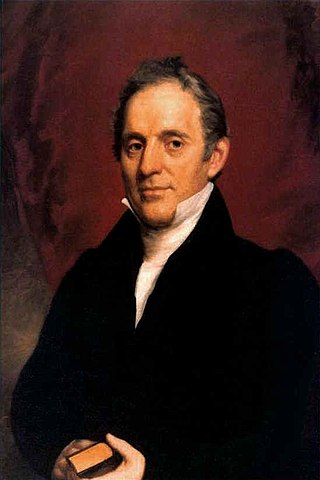
In Christianity, evangelism or witnessing is the act of preaching the gospel with the intention of sharing the message and teachings of Jesus Christ. It is sometimes associated with Christian missions.

A number of corporations are in use by Jehovah's Witnesses. They publish literature and perform other operational and administrative functions, representing the interests of the religious organization. "The Society" has been used as a collective term for these corporations.

Liang Fa (1789–1855), also known by other names, was the second Chinese Protestant convert and the first Chinese Protestant minister and evangelist. He was ordained by Robert Morrison, the first Protestant missionary in the Qing Empire. His tract Good Words to Admonish the Age was influential on Hong Xiuquan, who went on to lead the Taiping Rebellion.

The British and Foreign Bible Society, often known in England and Wales as simply the Bible Society, is a non-denominational Christian Bible society with charity status whose purpose is to make the Bible available throughout the world.
The Dairyman's Daughter is an early 19th-century Christian religious booklet of 52 pages, which had a remarkably wide distribution and influence. It was a narrative of the religious experience of Elizabeth Wallbridge, who was the person after whom the book was named.
The Watch Tower Bible and Tract Society produces a significant amount of printed and electronic literature, primarily for use by Jehovah's Witnesses. Their best known publications are the magazines, The Watchtower and Awake!
The American Unitarian Association (AUA) was a religious denomination in the United States and Canada, formed by associated Unitarian congregations in 1825. In 1961, it consolidated with the Universalist Church of America to form the Unitarian Universalist Association.

The Religious Tract Society was a British evangelical Christian organization founded in 1799 and known for publishing a variety of popular religious and quasi-religious texts in the 19th century. The society engaged in charity as well as commercial enterprise, publishing books and periodicals for profit.

A Bible society is a non-profit organization, usually nondenominational in makeup, devoted to translating, publishing, and distributing the Bible at affordable prices. In recent years they also are increasingly involved in advocating its credibility and trustworthiness in contemporary cultural life. Traditionally Bible society editions contain scripture, without any doctrinal notes or comments, although they may include non-sectarian notes on alternate translations of words, or variations in the different available manuscripts.

A tract is a literary work and, in current usage, usually religious in nature. The notion of what constitutes a tract has changed over time. By the early part of the 21st century, a tract referred to a brief pamphlet used for religious and political purposes, though far more often the former. Tracts are often either left for someone to find or handed out. However, there have been times in history when the term implied tome-like works. A tractate, a derivative of a tract, is equivalent in Hebrew literature to a chapter of the Christian Bible.
The American Baptist Home Mission Society is a Christian missionary society. Its main predecessor the Home Mission Society was established in New York City in 1832 to operate in the American frontier, with the stated mission "to preach the Gospel, establish churches and give support and ministry to the unchurched and destitute." In the 19th century, the Society was related to the Triennial Convention of Baptists. Today it is part of that Convention's successor, the American Baptist Churches, USA, and is the successor by merger of several 19th century Baptist organizations related to missions and education, including publications (1824), women (1877), and education (1888)

Colportage is the distribution of publications, books, and religious tracts by carriers called "colporteurs" or "colporters". The term does not necessarily refer to religious book peddling.
Crossway is a not-for-profit evangelical Christian publishing ministry headquartered in Wheaton, Illinois. Clyde and Muriel Dennis founded Good News Publishers in 1938, working out of their home in Minneapolis, Minnesota.

Asahel Nettleton was an American theologian and Evangelist from Connecticut who was highly influential during the Second Great Awakening. The number of people converted to Christianity as a result of his ministry was estimated by one biographer at 30,000. He participated in the New Lebanon Conference in 1827, during which he and Lyman Beecher opposed the teachings of Charles Grandison Finney.

Samuel Miller was a Presbyterian theologian who taught at Princeton Theological Seminary.

In missions history, a Bible woman was a local woman who supported foreign female missionaries in their Christian evangelistic and social work.

The Bible Society of Singapore, Malaysia and Brunei was a nondenominational Christian organisation committed to translating and distributing the Bible in Singapore, Malaysia, and Brunei. It was the successor organisation to the Bible Society of Malaya, a branch of the National Bible Society of Scotland (NBSS). The Bible Society of Malaya prior to 1948 was a branch of the British and Foreign Bible Society (BFBS).

150 Nassau Street, also known as the Park Place Tower and the American Tract Society Building, is a 23-story, 291-foot (89 m) building in the Financial District of Lower Manhattan in New York City. It is located at the southeast corner of Spruce Street and Nassau Street, next to 8 Spruce Street, the former New York Times Building, and New York City Hall.

William Hallock Johnson was an American educator who served as president of the historically black Lincoln University of Pennsylvania from 1926 to 1936. He had a liberalizing effect on the institution, presiding over the appointment of its first Black faculty member, and substantially reduced the university's debt.
Russel(l) Sturgis Cook (1811–1864) was an American Congregationalist minister, and a secretary of the American Tract Society from 1839 to 1856. He was known also as Russell Salmon Cook, and built up colportage as basic to the Society's business model.














